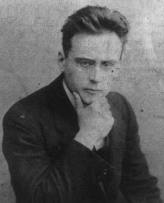Anton Webern
 Mittersill, Salzburgo, Austria
|nacionalidad=
|ocupación=Compositor, musicólogo
|cónyuge=
|hijos=
}}
Mittersill, Salzburgo, Austria
|nacionalidad=
|ocupación=Compositor, musicólogo
|cónyuge=
|hijos=
}}Anton (von) Webern (Viena, 3 de diciembre de 1883-Mittersill, Salzburgo; 15 de septiembre de 1945) fue un compositor austríaco.
Fue miembro de la llamada Segunda Escuela de Viena. Como estudiante y brillante seguidor de Arnold Schoenberg, es uno de los más conocidos exponentes del dodecafonismo; además, sus innovaciones referentes a la organización sistemática de altura, ritmo y dinámica fueron decisivas para el estilo musical conocido más tarde como serialismo. proporcionado por Wikipedia
Mostrando 1 - 20 Resultados de 29 Para Buscar 'Webern, Anton, 1883-1945', tiempo de consulta: 0.04s
Limitar resultados
-
1por Webern, Anton, 1883-1945Otros Autores: “…Webern, Anton, 1883-1945…”
Publicado 1994
Número de Clasificación: Cargando…
Ubicado: Cargando…CD Audiom Cargando… -
2por Webern, Anton, 1883-1945Otros Autores:
Publicado 1995Número de Clasificación: Cargando…
Ubicado: Cargando…CD Audiom Cargando… -
3por Webern, Anton, 1883-1945
Publicado 1949Número de Clasificación: Cargando…
Ubicado: Cargando…Partituras Libro Cargando… -
4por Webern, Anton, 1883-1945
Publicado 1923Número de Clasificación: Cargando…
Ubicado: Cargando…Partituras Libro Cargando… -
5por Webern, Anton, 1883-1945
Publicado 1948Número de Clasificación: Cargando…
Ubicado: Cargando…Partituras Libro Cargando… -
6por Webern, Anton, 1883-1945
Publicado 1957Número de Clasificación: Cargando…
Ubicado: Cargando…Partituras Libro Cargando… -
7por Webern, Anton, 1883-1945
Publicado 1956Número de Clasificación: Cargando…
Ubicado: Cargando…Partituras Libro Cargando… -
8por Webern, Anton, 1883-1945
Publicado 1955Número de Clasificación: Cargando…
Ubicado: Cargando…Partituras Libro Cargando… -
9por Webern, Anton, 1883-1945
Publicado 1938Número de Clasificación: Cargando…
Ubicado: Cargando…Partituras Libro Cargando… -
10por Webern, Anton, 1883-1945
Publicado 1956Número de Clasificación: Cargando…
Ubicado: Cargando…Partituras Libro Cargando… -
11por Webern, Anton, 1883-1945
Publicado 1956Número de Clasificación: Cargando…
Ubicado: Cargando…Partituras Libro Cargando… -
12por Webern, Anton, 1883-1945
Publicado 1957Número de Clasificación: Cargando…
Ubicado: Cargando…Partituras Libro Cargando… -
13por Webern, Anton, 1883-1945
Publicado 1956Número de Clasificación: Cargando…
Ubicado: Cargando…Partituras Libro Cargando… -
14por Webern, Anton, 1883-1945
Publicado 1948Número de Clasificación: Cargando…
Ubicado: Cargando…Partituras Libro Cargando… -
15por Webern, Anton, 1883-1945
Publicado 1956Número de Clasificación: Cargando…
Ubicado: Cargando…Partituras Libro Cargando… -
16por Webern, Anton, 1883-1945
Publicado 1970Número de Clasificación: Cargando…
Ubicado: Cargando…Partituras Libro Cargando… -
17El Camino hacia la nueva música, 1933 : seguido de El camino hacia la composición dodecafónica, 1932por Webern, Anton, 1883-1945Otros Autores:
Publicado 2009Número de Clasificación: Cargando…
Ubicado: Cargando…Libro Cargando… -
18por Schoenberg, Arnold, 1874-1951Otros Autores:
Publicado 1993Número de Clasificación: Cargando…
Ubicado: Cargando…CD Audiom Cargando… -
19por Brahms, Johannes, 1833-1897Otros Autores: “…Webern, Anton, 1883-1945…”
Publicado 1990
Número de Clasificación: Cargando…
Ubicado: Cargando…CD Audiom Cargando… -
20Publicado 1980Otros Autores:Número de Clasificación: Cargando…
Ubicado: Cargando…CD Audiom Cargando…
Herramientas de búsqueda:
RSS
Materias Relacionadas
Música orquestal
Música instrumental
Cantatas, Secular
Música de cámara
Partituras
Sonatas (Piano)
Variaciones (Orquesta)
Cantatas sacras
Cantatas seglares
Cantatas, Sacras
Chansons (Voix aiguë) acc. d'orchestre
Chansons (Voix aiguë) acc. d'orchestre de chambre
Choruses, Secular (Mixed voices) with instrumental ensemble
Choruses, Secular (Mixed voices), Unaccompanied
Concertos (Violon)
Conciertos (Conjunto instrumental)
Coros, Secular (voces mixtas) con esamble de instrumentos
Coros, secular (voces mixtas), con acompañamiento
Coros, secular (voces mixtas, 4 partes) con orquesta
Cuarteto de cuerda
Cuarteto de cuerdas
Cuartetos de cuerda
Historia y crítica
Monologues with music (Instrumental ensemble)
Monólogos con música (Coro y orquesta)
Monólogos con música (Voz y conjunto instrumental)
Musical settings
Música
Música coral
Música orquestal, Arreglos
